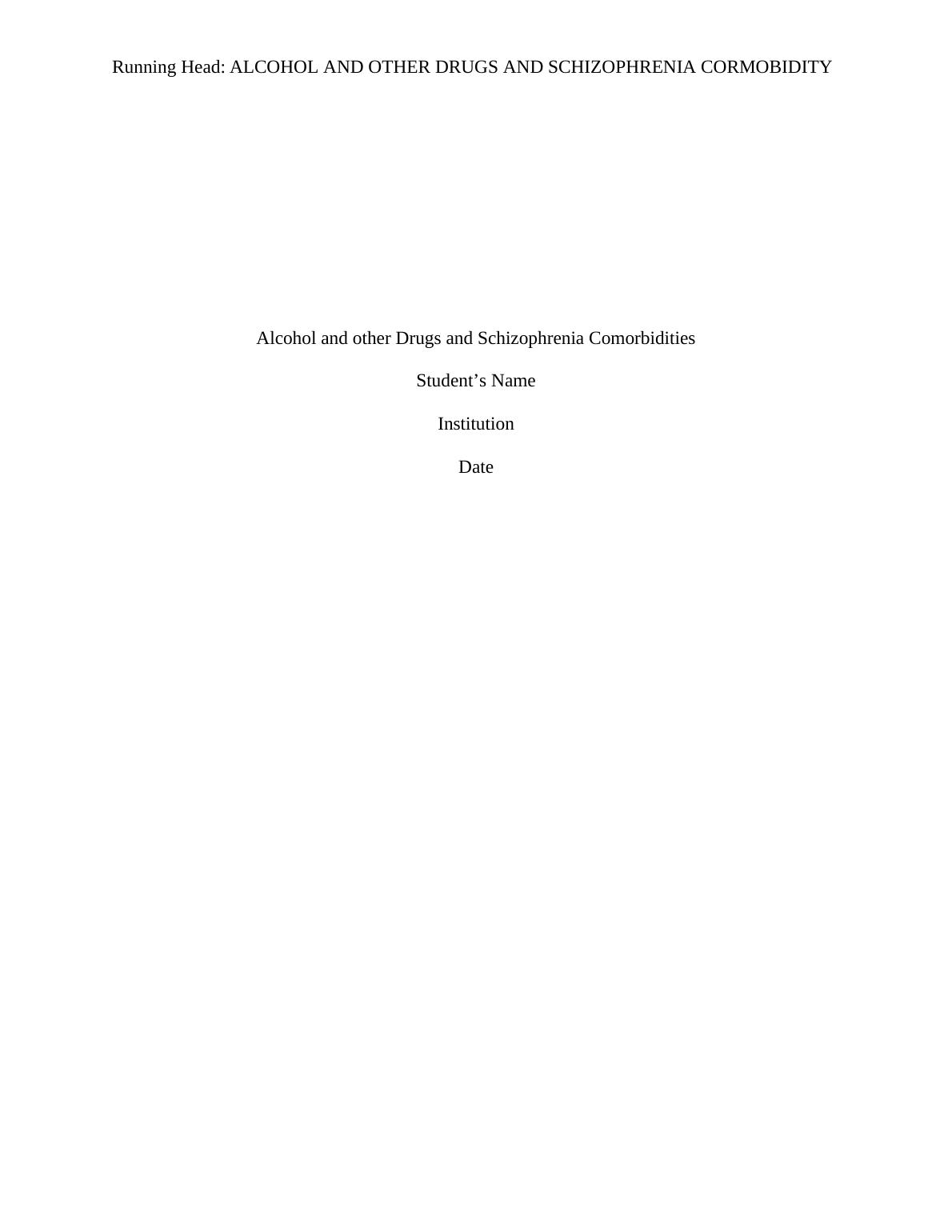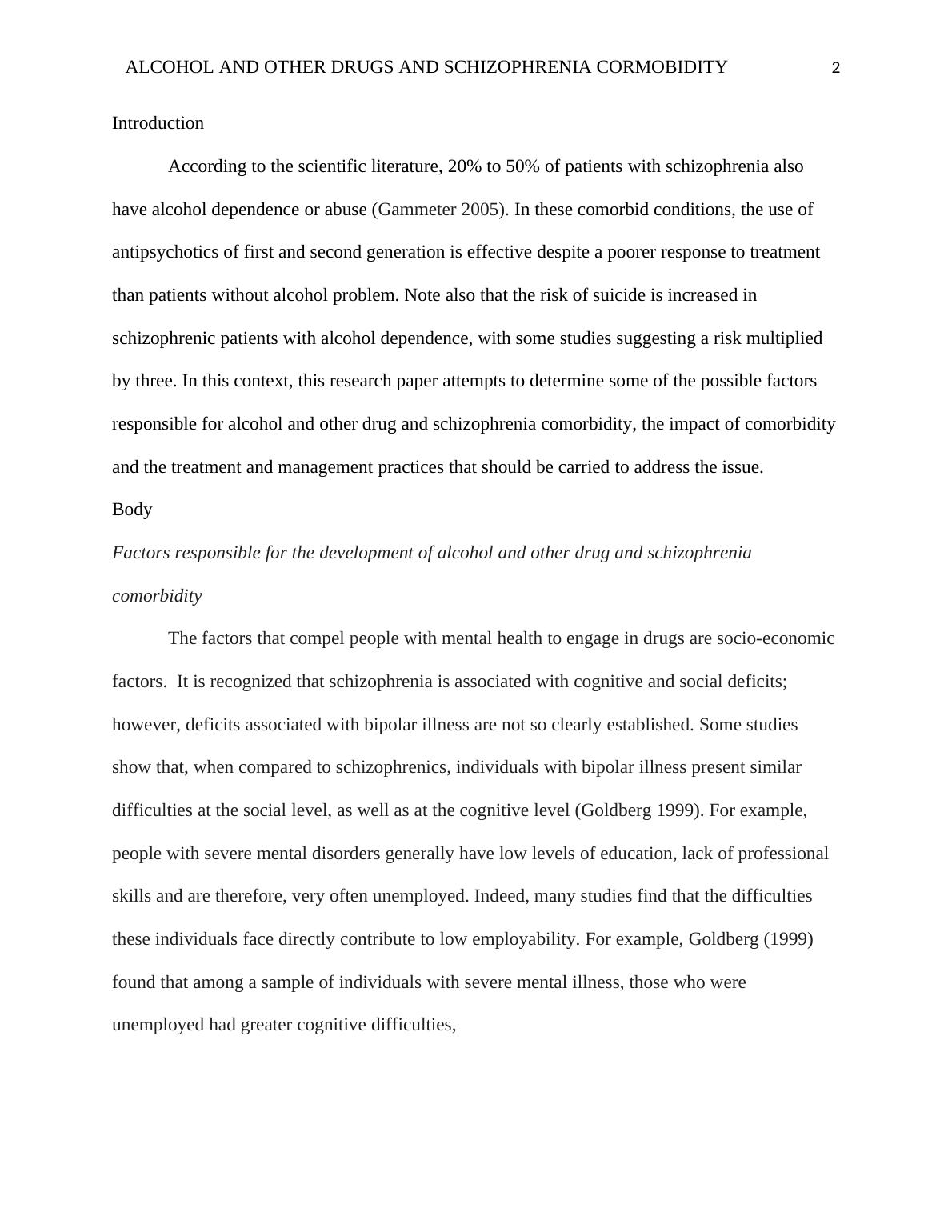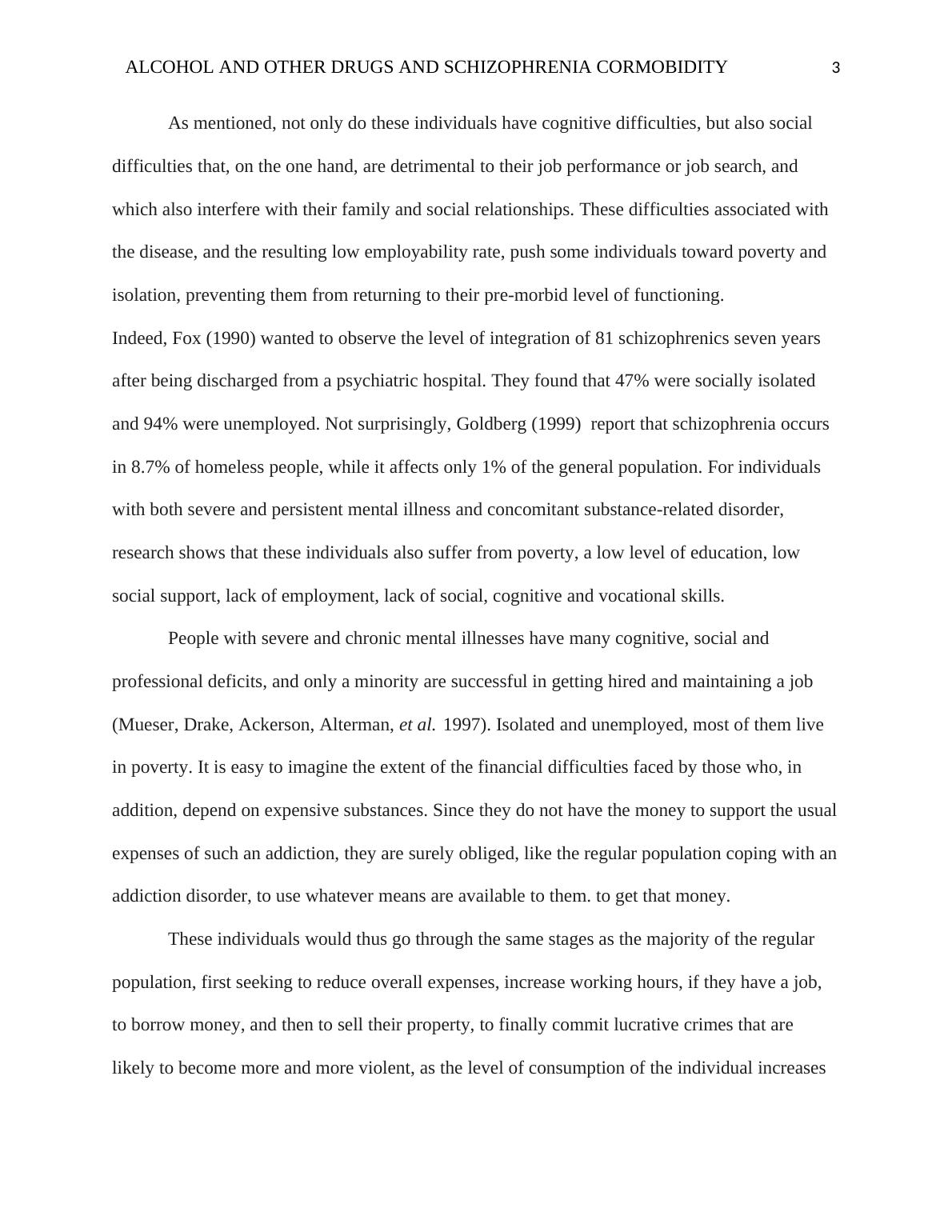Alcohol and other Drugs and Schizophrenia Comorbidities
Added on 2023-06-07
10 Pages2755 Words158 Views
Running Head: ALCOHOL AND OTHER DRUGS AND SCHIZOPHRENIA CORMOBIDITY
Alcohol and other Drugs and Schizophrenia Comorbidities
Student’s Name
Institution
Date
Alcohol and other Drugs and Schizophrenia Comorbidities
Student’s Name
Institution
Date

ALCOHOL AND OTHER DRUGS AND SCHIZOPHRENIA CORMOBIDITY 2
Introduction
According to the scientific literature, 20% to 50% of patients with schizophrenia also
have alcohol dependence or abuse (Gammeter 2005). In these comorbid conditions, the use of
antipsychotics of first and second generation is effective despite a poorer response to treatment
than patients without alcohol problem. Note also that the risk of suicide is increased in
schizophrenic patients with alcohol dependence, with some studies suggesting a risk multiplied
by three. In this context, this research paper attempts to determine some of the possible factors
responsible for alcohol and other drug and schizophrenia comorbidity, the impact of comorbidity
and the treatment and management practices that should be carried to address the issue.
Body
Factors responsible for the development of alcohol and other drug and schizophrenia
comorbidity
The factors that compel people with mental health to engage in drugs are socio-economic
factors. It is recognized that schizophrenia is associated with cognitive and social deficits;
however, deficits associated with bipolar illness are not so clearly established. Some studies
show that, when compared to schizophrenics, individuals with bipolar illness present similar
difficulties at the social level, as well as at the cognitive level (Goldberg 1999). For example,
people with severe mental disorders generally have low levels of education, lack of professional
skills and are therefore, very often unemployed. Indeed, many studies find that the difficulties
these individuals face directly contribute to low employability. For example, Goldberg (1999)
found that among a sample of individuals with severe mental illness, those who were
unemployed had greater cognitive difficulties,
Introduction
According to the scientific literature, 20% to 50% of patients with schizophrenia also
have alcohol dependence or abuse (Gammeter 2005). In these comorbid conditions, the use of
antipsychotics of first and second generation is effective despite a poorer response to treatment
than patients without alcohol problem. Note also that the risk of suicide is increased in
schizophrenic patients with alcohol dependence, with some studies suggesting a risk multiplied
by three. In this context, this research paper attempts to determine some of the possible factors
responsible for alcohol and other drug and schizophrenia comorbidity, the impact of comorbidity
and the treatment and management practices that should be carried to address the issue.
Body
Factors responsible for the development of alcohol and other drug and schizophrenia
comorbidity
The factors that compel people with mental health to engage in drugs are socio-economic
factors. It is recognized that schizophrenia is associated with cognitive and social deficits;
however, deficits associated with bipolar illness are not so clearly established. Some studies
show that, when compared to schizophrenics, individuals with bipolar illness present similar
difficulties at the social level, as well as at the cognitive level (Goldberg 1999). For example,
people with severe mental disorders generally have low levels of education, lack of professional
skills and are therefore, very often unemployed. Indeed, many studies find that the difficulties
these individuals face directly contribute to low employability. For example, Goldberg (1999)
found that among a sample of individuals with severe mental illness, those who were
unemployed had greater cognitive difficulties,

ALCOHOL AND OTHER DRUGS AND SCHIZOPHRENIA CORMOBIDITY 3
As mentioned, not only do these individuals have cognitive difficulties, but also social
difficulties that, on the one hand, are detrimental to their job performance or job search, and
which also interfere with their family and social relationships. These difficulties associated with
the disease, and the resulting low employability rate, push some individuals toward poverty and
isolation, preventing them from returning to their pre-morbid level of functioning.
Indeed, Fox (1990) wanted to observe the level of integration of 81 schizophrenics seven years
after being discharged from a psychiatric hospital. They found that 47% were socially isolated
and 94% were unemployed. Not surprisingly, Goldberg (1999) report that schizophrenia occurs
in 8.7% of homeless people, while it affects only 1% of the general population. For individuals
with both severe and persistent mental illness and concomitant substance-related disorder,
research shows that these individuals also suffer from poverty, a low level of education, low
social support, lack of employment, lack of social, cognitive and vocational skills.
People with severe and chronic mental illnesses have many cognitive, social and
professional deficits, and only a minority are successful in getting hired and maintaining a job
(Mueser, Drake, Ackerson, Alterman, et al. 1997). Isolated and unemployed, most of them live
in poverty. It is easy to imagine the extent of the financial difficulties faced by those who, in
addition, depend on expensive substances. Since they do not have the money to support the usual
expenses of such an addiction, they are surely obliged, like the regular population coping with an
addiction disorder, to use whatever means are available to them. to get that money.
These individuals would thus go through the same stages as the majority of the regular
population, first seeking to reduce overall expenses, increase working hours, if they have a job,
to borrow money, and then to sell their property, to finally commit lucrative crimes that are
likely to become more and more violent, as the level of consumption of the individual increases
As mentioned, not only do these individuals have cognitive difficulties, but also social
difficulties that, on the one hand, are detrimental to their job performance or job search, and
which also interfere with their family and social relationships. These difficulties associated with
the disease, and the resulting low employability rate, push some individuals toward poverty and
isolation, preventing them from returning to their pre-morbid level of functioning.
Indeed, Fox (1990) wanted to observe the level of integration of 81 schizophrenics seven years
after being discharged from a psychiatric hospital. They found that 47% were socially isolated
and 94% were unemployed. Not surprisingly, Goldberg (1999) report that schizophrenia occurs
in 8.7% of homeless people, while it affects only 1% of the general population. For individuals
with both severe and persistent mental illness and concomitant substance-related disorder,
research shows that these individuals also suffer from poverty, a low level of education, low
social support, lack of employment, lack of social, cognitive and vocational skills.
People with severe and chronic mental illnesses have many cognitive, social and
professional deficits, and only a minority are successful in getting hired and maintaining a job
(Mueser, Drake, Ackerson, Alterman, et al. 1997). Isolated and unemployed, most of them live
in poverty. It is easy to imagine the extent of the financial difficulties faced by those who, in
addition, depend on expensive substances. Since they do not have the money to support the usual
expenses of such an addiction, they are surely obliged, like the regular population coping with an
addiction disorder, to use whatever means are available to them. to get that money.
These individuals would thus go through the same stages as the majority of the regular
population, first seeking to reduce overall expenses, increase working hours, if they have a job,
to borrow money, and then to sell their property, to finally commit lucrative crimes that are
likely to become more and more violent, as the level of consumption of the individual increases

End of preview
Want to access all the pages? Upload your documents or become a member.
Related Documents
Social Work Practice and Mental Health: Understanding Schizophrenialg...
|3
|663
|320
Treatment Options and Nursing Interventions for Mental Health Disorderslg...
|8
|2200
|167
Mental Health Disorders in Australialg...
|12
|2850
|279
Mental Health Issues and Aging: Impacts, Interventions, and Social Serviceslg...
|1
|1637
|486
Health Disorders: Types, Behaviors, and Treatmentslg...
|5
|786
|92
Relationship Between Substance Abuse and Mood Disorderslg...
|4
|827
|57